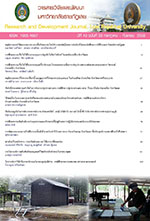การวิเคราะห์ความสัมพันธ์ของครูดนตรีไทยกับหลักคำสอนในศาสนาพุทธ
Keywords:
การวิเคราะห์, ความสัมพันธ์, ครูดนตรีไทย, ศาสนาพุทธ, an analysis, the relationship, Thai classical music teachers, the teaching principles in BuddhismAbstract
การวิจัยเรื่องนี้มีวัตถุประสงค์ เพื่อศึกษาเรื่องครูดนตรีไทย และเพื่อวิเคราะห์ความสัมพันธ์ของครูดนตรีไทยที่เกี่ยวข้องกับหลักคำสอนในศาสนาพุทธ โดยใช้วิจัยเชิงคุณภาพ โดยการประมวลเอกสารและงานวิจัยที่เกี่ยวข้อง และการสัมภาษณ์ผลการวิจัยด้านครูดนตรีไทย พบว่า ครูดนตรีไทยมี 2 ประเภท คือ ครูที่มีเฉพาะจิตวิญญาณหรือดุริยเทพ มี 3 องค์ ได้แก่ พระวิษณุกรรม พระปัญจสิงขรณ์ และพระประคนธรรพ และครูดนตรีไทยที่เสียชีวิตไปแล้วที่เกิดอยู่ใน ภพภูมิต่างๆ ทั้ง 31 ภพภูมิตามหลักคำสอนในศาสนาพุทธ ส่วนครูที่เป็นมนุษย์ ได้แก่ ครูที่ทาหน้าที่สอนดนตรีไทยในปัจจุบันทั้งสอนโดยตรงและโดยอ้อม ครูที่สอนดนตรีไทยโดยตรง ได้แก่ ครูที่สอนในสานักดนตรี บ้านดนตรี โรงเรียนสอนดนตรี และสถาบันการศึกษาทุกระดับ ส่วนครูที่สอนดนตรีไทยโดยอ้อม ได้แก่ ครูพักลักจำ หมายถึงนักดนตรีไม่ได้เรียนดนตรีไทยโดยตรงจากครูเหล่านี้ แต่จาวิธีการบรรเลงหรือได้รับความรู้และประสบการณ์ด้านดนตรีไทย โดยผ่านบุคคล ผ่านสื่อต่างๆ เช่น หนังสือ แถบบันทึกเสียง วีซีดี โทรทัศน์ วิทยุ และสื่ออื่นๆ และครูดนตรีไทยอีกประเภทหนึ่งคือครูที่ประดิษฐ์เครื่องดนตรีไทยให้นักดนตรีใช้บรรเลง จุดศูนย์กลางของครูดนตรีไทยเริ่มที่ภาคกลางก่อน จุดศูนย์กลางอยู่ที่กรุงเทพมหานคร ต่อเมื่อ พ.ศ. 2475 จนถึงปัจจุบัน ได้ขยายการจัดการศึกษาดนตรีไทยไปสู่ส่วนภูมิภาค ทั่วประเทศไทย ครูดนตรีไทยได้กระจายออกสู่ส่วนภูมิภาคด้วย ส่วนการสอนของครูดนตรีไทยยังใช้วิธีการสอน แบบมุขปาฐะเหมือนเดิม แต่ประยุกต์การสอนให้เข้ากับยุคสมัยคือ นำโน้ตหรือเทคโนโลยีใหม่ๆ มาใช้เพื่อช่วยจามากยิ่งขึ้น เพราะเทคนิคการสอนดนตรีไทยบางอย่างไม่สามารถบันทึกโน้ตได้ และครูดนตรีไทยเชื่อว่าศิลปะที่แท้จริงจะเริ่มต้นที่จิตก่อนแล้วแสดงออกทางกายด้วยวิธีการบรรเลงและวาจาด้วยวิธีการขับร้อง จึงเป็นศิลปะที่สมบูรณ์แบบ
ส่วนหนึ่งของการสอนดนตรีไทยจะให้ความสำคัญของครูมาก กิจกรรมที่แสดงออกถึงความเคารพ ความกตัญญูกตเวทีต่อครูคือการไหว้ครูดนตรีไทย เป็นพิธีกรรมที่สืบทอดมาทุกยุคทุกสมัยจนถึงปัจจุบัน ในทางดนตรีไทยเชื่อว่าครูดนตรีไทยทั้ง 2 ประเภทมีจริง การแสดงความเคารพต่อครูเป็นการแสดงออกทั้งทางกาย ทางวาจา ทางใจ โดยการไหว้ครูก่อนและหลังการบรรเลงดนตรีไทยทุกครั้ง และพิธีกรรมไหว้ครู ก่อนเข้าศึกษา ขณะที่กำลังศึกษาและสำเร็จการศึกษาดนตรีไทยแต่ละระดับ ส่วนความสัมพันธ์ของครูดนตรีไทยกับหลักคำสอนในศาสนาพุทธ พบว่า ความแตกต่างของทุกพฤติกรรมในชีวิตส่วนตัวและชีวิตด้านดนตรีไทย เกิดจากผลการกระทาของครูเอง (วิบากกรรม) ตามกฎแห่งกรรม และการเปลี่ยนแปลงใดๆ ในชีวิตของครูเหล่านี้ทั้งด้านส่วนตัวหรือด้านดนตรีไทย เป็นเรื่องปกติ เพราะทุกสิ่งทุกอย่างทุกพฤติกรรม ทุกความรู้สึกนึกคิดของครูดนตรีไทยอยู่ภายใต้กฎธรรมชาติอนิจจัง ทุกขัง อนัตตา หมายถึง ทุกสิ่งทุกอย่างไม่มีสิ่งใดเที่ยงแท้แน่นอน ทุกสิ่งทุกอย่างเปลี่ยนอยู่ตลอดเวลา และทุกสิ่งทุกอย่างไม่มีตัวตนที่แท้จริงทั้งที่เป็นรูปธรรมและนามธรรม ตามหลักคำสอนในศาสนาพุทธ
An Analysis of the Relationship Between Thai Classical Music Teachers and the Teaching Principles In Buddhism
This research aims to study the classical music teachers, and to analyze the relationship of Thai classical music teacher related to the Buddha’s Principles (Dhamma). Qualitative research was used, and the data was collected from related documents and research and from the interview.
The study found that Thai classical music teachers can be generalized into 2 types; the first type was spiritual teachers consisted of 3 gods ; Phra Vishanukum (Vishvakarman or Witsanuphrom), Phra Parakontun (Gandharva), and Pra Panjasingkorn, and Thai classical music teachers who died and reincarnated in 31 spiritual worlds as told in Buddha’s Dhamma, and the second type was the Thai classical teachers in the physical world who teach music directly or indirectly. The teachers who directly teach music included the teachers of the music center, music house, music schools, and every level of educational institutes.The teachers who indirectly teach music included that of Kru-Pak-Lak-Jam which means all kinds of materials or things that teach music to people in term of giving experiences, or knowledge through musical performers or media such as books, records, VCD, television, radio, and others. Another kind of teacher was the Thai musical instrument inventor who made the instruments for the musician or other people to play. The center of music was originated from the central region, Bangkok was the place. Later, in 1932 – present, the music education was spread to other regions throughout Thailand, and so do the music teachers. The teaching method of Thai classical music teacher was still by Oral Tradition but with the application of teaching method for the suitability of the current situation by the use of notes and new technologies to help memorizing the music. Some teaching methods of Thai music cannot be recorded, and Thai classical music teachers believe that the real art begins in the mind of people first, and then the art will be expressed with the physical act such as playing and singing which is the perfect result of art.
For Thai classical music teaching, the important part was paying respect to the teachers, gratefully, by paying homage to the teachers. Such respect was a ceremony that had been performing for a long period of time. In the context of Thai music, it was believed that the 2 types of teachers do exist. Paying homage was through the physical action, speeches, and mind. The “Wai Kru” will be performed before the show and after the show, and “Wai Kru” ceremony will be done before the study, during the study, and after the graduation of each level. For the relationship between Thai classical music teachers and the teaching principles in Buddhism, the study found that the differences in behaviors and the life of Thai music were the results from the teachers’ action regarding the Principles of Karma. This can be inferred that any change in life of those teachers, individually, or concerning the Thai classical music was normally happened under the law of nature. Since every behavior, feeling, and thought was uncertain, all kinds of thing kept changing all the time, and everything was not real, both concretely and abstractly, according to the Teaching Principles in Buddhism.
Downloads
How to Cite
Issue
Section
License
ข้อความที่ปรากฎในวารสารฉบับนี้เป็นความคิดเห็นของผู้เขียนแต่ละท่าน สถาบันวิจัยและพัฒนา มหาวิทยาลัยราชภัฏเลย และกองบรรณาธิการ ไม่จำเป็นต้องเห็นด้วยและไม่มีส่วนรับผิดชอบใดๆ
สถาบันวิจัยและพัฒนา มหาวิทยาลัยราชภัฏเลย ขอให้ผู้อ่านอ้างอิงในกรณีที่ท่านคัดลอกเนื้อหาบทความในวารสารฉบับนี้






